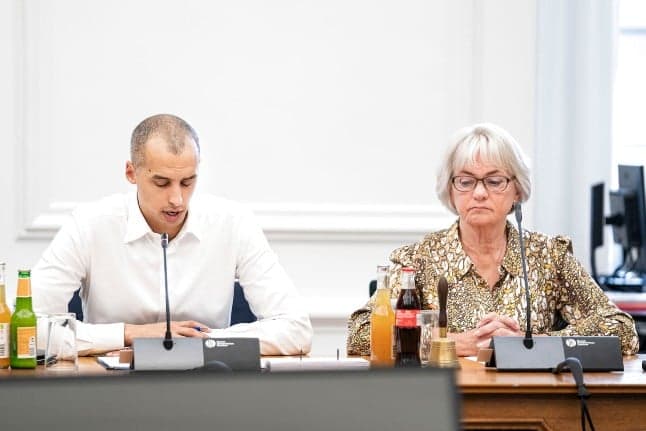Danish minister hails 'lovely numbers' as refugees leave

Denmark's integration minister has celebrated statistics showing more people with refugee backgrounds leaving the country than arriving as "lovely numbers".
According to the analysis by the Ministry of Immigration and Integration, the number of people granted asylum in Denmark who had chosen to leave the country in last year, exceeded new arrivals by 730.
This was the first time more people with refugee backgrounds have left the country than arrived since 2011.
"I am pleased, first of all, because it shows, in part, that we can keep the influx at bay by pursuing a sensible policy in Denmark," Mattias Tesfaye, the integration minister, said as the analysis was released.
"But also because there are refugees who would like to receive a bag of money and travel home and rebuild their own country."
About 500 of those who returned were taking part in a repatriation program in which Denmark's government pays for travel and offer refugees a small sum to help them resettle in their homelands.
Eva Singer, the head of asylum at the Danish Refugee Council, told The Local that she saw no reason to welcome the figures.
"This would be good news if it was a picture of the refugee situation globally -- if the lower level of asylum seekers coming to Denmark had been caused by a lower number globally in need of protection. But it is obviously not, because the number of refugees globally has increased."
The integration ministry's analysis showed that refugees from Somalia, Syria, Iraq and Bosnia-Herzegovina had been the most likely to return to their homelands.
On the other hand, there were still more refugees arriving from Eritrea, Iran and Afghanistan than were leaving Denmark.
Singer said that those who had taken part in the Danish government's repatriation programme, when surveyed, gave many different reasons for their decision.
"Some of them mentioned that it's very difficult in Denmark to learn the language, and also to get access to the labour market and if you don't get a job, it's very difficult financially."
She said the tough rhetoric and measures from Danish politicians in her opinion, only played a secondary role.
"The hostile environment is part of it, but it's not the main reason, I think."

Comments
See Also
According to the analysis by the Ministry of Immigration and Integration, the number of people granted asylum in Denmark who had chosen to leave the country in last year, exceeded new arrivals by 730.
This was the first time more people with refugee backgrounds have left the country than arrived since 2011.
"I am pleased, first of all, because it shows, in part, that we can keep the influx at bay by pursuing a sensible policy in Denmark," Mattias Tesfaye, the integration minister, said as the analysis was released.
"But also because there are refugees who would like to receive a bag of money and travel home and rebuild their own country."
About 500 of those who returned were taking part in a repatriation program in which Denmark's government pays for travel and offer refugees a small sum to help them resettle in their homelands.
Eva Singer, the head of asylum at the Danish Refugee Council, told The Local that she saw no reason to welcome the figures.
"This would be good news if it was a picture of the refugee situation globally -- if the lower level of asylum seekers coming to Denmark had been caused by a lower number globally in need of protection. But it is obviously not, because the number of refugees globally has increased."
The integration ministry's analysis showed that refugees from Somalia, Syria, Iraq and Bosnia-Herzegovina had been the most likely to return to their homelands.
On the other hand, there were still more refugees arriving from Eritrea, Iran and Afghanistan than were leaving Denmark.
Singer said that those who had taken part in the Danish government's repatriation programme, when surveyed, gave many different reasons for their decision.
"Some of them mentioned that it's very difficult in Denmark to learn the language, and also to get access to the labour market and if you don't get a job, it's very difficult financially."
She said the tough rhetoric and measures from Danish politicians in her opinion, only played a secondary role.
"The hostile environment is part of it, but it's not the main reason, I think."

Join the conversation in our comments section below. Share your own views and experience and if you have a question or suggestion for our journalists then email us at [email protected].
Please keep comments civil, constructive and on topic – and make sure to read our terms of use before getting involved.
Please log in here to leave a comment.